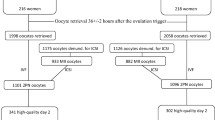Abstract
Since the birth of Louise Brown, in vitro fertilization (IVF) stimulation protocols have evolved significantly. One particular area of focus has been the process of final oocyte maturation, during which the oocyte gains competence to support fertilization and early embryonic development up to implantation. The field of human assisted reproductive technology (ART) is witnessing increased utilization of GnRH agonists (GnRHa) as trigger agents, in addition to or instead of the traditionally used human chorionic gonadotropin (hCG). Future translational studies will reveal whether oocyte developmental competence, as reflected in live birth outcomes, are not only non-inferior, but also superior with the use of GnRHa as a trigger for both nuclear and cytoplasmic oocyte maturation.
Similar content being viewed by others
References
Steptoe PC, Edwards RG. Birth after the reimplantation of a human embryo. Lancet. 1978;2(8085):366.
Edwards RG, Steptoe PC, Purdy JM. Establishing full-term human pregnancies using cleaving embryos grown in vitro. Br J Obstet Gynaecol. 1980;87(9):737–56.
Abbara A, Clarke SA, Dhillo WS. Novel concepts for inducing final oocyte maturation in in vitro fertilization treatment. Endocr Rev. 2018;39(5):593–628.
Robker RL, Hennebold JD, Russell DL. Coordination of ovulation and oocyte maturation: a good egg at the right time. Endocrinology. 2018;159(9):3209–18.
Quaas AM, Legro RS. Pharmacology of medications used for ovarian stimulation. Best Pract Res Clin Endocrinol Metab. 2019;33(1):21–33.
Lamb JD, Shen S, McCulloch C, Jalalian L, Cedars MI, Rosen MP. Follicle-stimulating hormone administered at the time of human chorionic gonadotropin trigger improves oocyte developmental competence in in vitro fertilization cycles: a randomized, double-blind, placebo-controlled trial. Fertil Steril. 2011;95(5):1655–60.
Schally AV, Arimura A, Kastin AJ, Matsuo H, Baba Y, Redding TW, et al. Gonadotropin-releasing hormone: one polypeptide regulates secretion of luteinizing and follicle-stimulating hormones. Science. 1971;173(4001):1036–8.
Padula AM. GnRH analogues--agonists and antagonists. Anim Reprod Sci. 2005;88(1-2):115–26.
Knobil E, Plant T, Wildt L, Belchetz P, Marshall G. Control of the rhesus monkey menstrual cycle: permissive role of hypothalamic gonadotropin-releasing hormone. Science. 1980;207(4437):1371–3.
Olivennes F, Cunha-Filho JS, Fanchin R, Bouchard P, Frydman R. The use of GnRH antagonists in ovarian stimulation. Hum Reprod Update. 2002;8(3):279–90.
Humaidan P, Polyzos NP, Alsbjerg B, Erb K, Mikkelsen AL, Elbaek HO, et al. GnRHa trigger and individualized luteal phase hCG support according to ovarian response to stimulation: two prospective randomized controlled multi-centre studies in IVF patients. Hum Reprod. 2013;28(9):2511–21.
Quaas AM, Hansen KR. Time to “cool off”? Examining indications for “elective deferred frozen embryo transfer”. J Assist Reprod Genet. 2016;33(12):1551–2.
Cimadomo D, et al. Oocyte competence is independent of the ovulation trigger adopted. A large observational study in a setting that entails vitrified-warmed single euploid blastocyst transfer. J Assist Reprod Genet. 2021. https://doi.org/10.1007/s10815-021-02124.
Roa J, Navarro VM, Tena-Sempere M. Kisspeptins in reproductive biology: consensus knowledge and recent developments. Biol Reprod. 2011;85(4):650–60.
Author information
Authors and Affiliations
Corresponding author
Additional information
Publisher’s note
Springer Nature remains neutral with regard to jurisdictional claims in published maps and institutional affiliations.
Rights and permissions
About this article
Cite this article
Quaas, A.M. Triggering change in stimulation protocols: a matter of oocyte maturation and beyond. J Assist Reprod Genet 38, 1285–1287 (2021). https://doi.org/10.1007/s10815-021-02223-z
Received:
Accepted:
Published:
Issue Date:
DOI: https://doi.org/10.1007/s10815-021-02223-z




